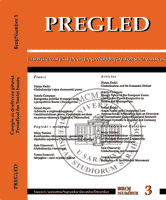Arbitraža u anglosaksonskom i kontinentalnom pravu, s posebnim osvrtom na pravne sisteme u Engleskoj i Njemačkoj
Anglo Saxon and Continental Law Approaches to Arbitration with an Overview of International Conventions and Research of Legal Systems in England
Author(s): Senad BajrićSubject(s): Law, Constitution, Jurisprudence
Published by: Univerzitet u Sarajevu
Keywords: arbitration; arbitration procedures; resolutions; international acts; recognition and execution of foreign arbitration resolutions; arbitration agreement.
Summary/Abstract: Disputes between the parties in modern legal systems are resolved in front of state courts, selected courts (arbitration) or in front of specialized bodies (legally enforced) whose function is to intermediate between the parties. According to the law theory and practice, the dispute can be solved in two different ways: either by adjudication procedures or by non-adjudication procedures. Adjudication procedures are the ones performed in front of state courts or by arbitration; both are authorized to pass an obligatory decision for parties, which holds an executive competence, while non-adjudication procedures present different alternatives for dispute resolutions such as reconciliation or intermediation. Arbitration is strictly based on the will of parties. Arbitrage surely has advantages compared to state courts, such as the ability to select a competent individual who is to handle arbitrage, faster procedures, possibility to negotiate an agreement in the competent law, and confidentiality of documentation and proceedings. In most agreements with international characteristics such as: selling, distribution, licensing and joined investments, agreed parties are worried about favoring one side while applying domiciling principals to determine the relevant law, which resulted in a rise of importance of arbitration in the international economy. Legal systems in England and Germany are the systems that hold a very long tradition in arbitrage proceedings. The aforementioned countries have a wellregulated arbitration legislative, either as separate laws or as a part of some other laws (which are mainly the laws related to civil proceedings). A significant number of international acts which regulate this issue, such as the 1923 Geneva Protocol on Arbitration Clauses, the 1927 Geneva Convention on Execution of Foreign Arbitrary Decisions, the 1958 New York Convention on Recognition and Execution of Foreign Decisions, etc., are a sign that arbitrage has become an important factor in “making the balance in international economy”.
Journal: PREGLED - časopis za društvena pitanja
- Issue Year: XLIX/2008
- Issue No: 3
- Page Range: 85-107
- Page Count: 23
- Language: Bosnian

